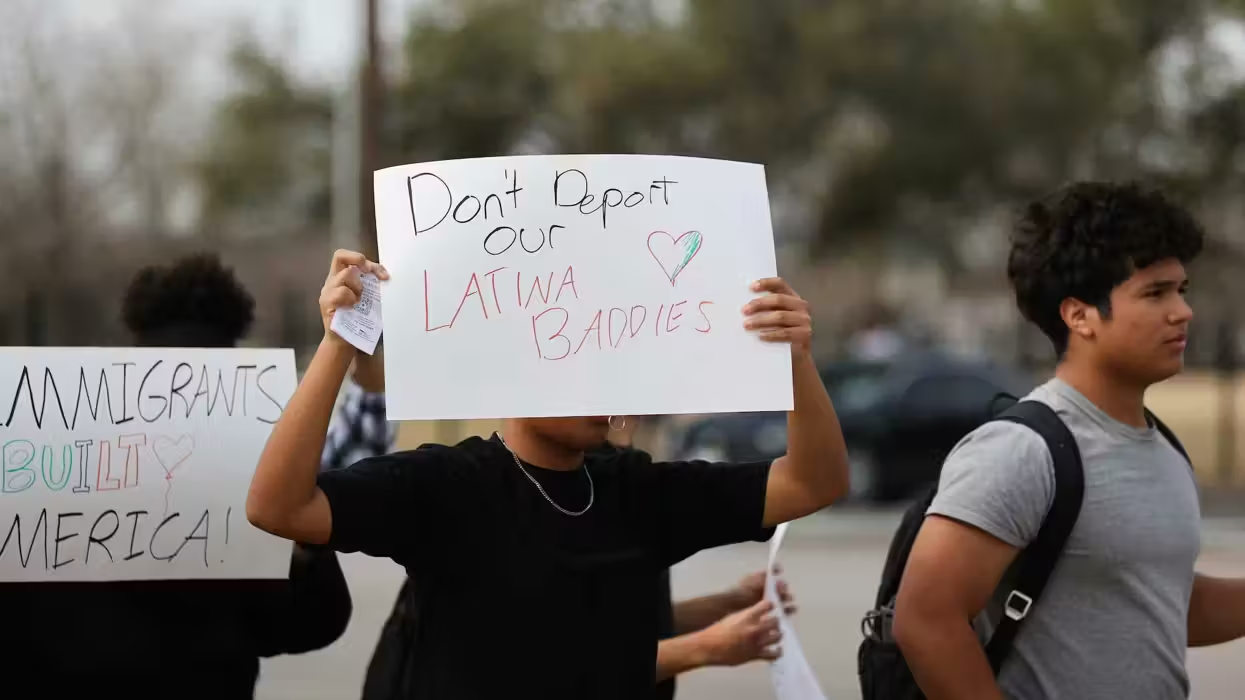
© 2026 Blaze Media LLC. All rights reserved.
 A women's division of the Polisario Front during a military parade in Southeastern Algeria (AP)
A women's division of the Polisario Front during a military parade in Southeastern Algeria (AP)
New reports emerged this week from the Malian foreign minister Tiéman Coulibaly suggesting that Polisario fighters are among the terrorist groups to overtake northern Mali, where numerous Al Qaeda and Al Qaeda-related groups have gathered in an acknowledged effort to turn the territory into a Sharia state.
If you've never heard of the Polisario, you're not alone. The Polisario is a socialist national liberation movement that's been working to end Moroccan occupation of Western Sahara, a disputed territory just south of Morocco, in an at-times bloody conflict that's been raging for nearly four decades, and largely ignored by the West.
In recent years, some, including me, have argued that the Polisario camps set up in Tindouf, Algeria have become a recruiting ground for Al Qaeda. This is an assertion that the Polisario and many other state governments have officially denied, preferring instead to tow the Polisario line that they are a peaceful, apolitical movement merely looking to reclaim land that was never in fact theirs.
In 2009, I traveled to Western Sahara to visit with Sahrawi refugees from the Tindouf camps. The refugees, many of whom risked their lives to escape the brutal conditions of the camps, and some of whom had to leave family behind, told me a different story, insisting that Al Qaeda had very much infiltrated the camps and were recruiting amirs, or princes, from within them, often involuntarily. I documented that trip in a long feature I wrote for Townhall in 2009.
Shortly after the piece ran, a report from Middle East Newsline revealed that Algeria's intelligence community had determined that Al Qaeda was in fact cooperating with the Polisario.
"Algerian security sources said Polisario, long backed by Algiers, has been providing safe haven as well as logistics to the Al Qaeda Organization in the Islamic Maghreb. The sources said Al Qaeda has been financing Polisario convoys that have brought everything from food to weapons and explosives to AQIM."
 Polisarion Front Soldiers in a February 2011 Parade (photo REUTERS/Juan Medina)
Polisarion Front Soldiers in a February 2011 Parade (photo REUTERS/Juan Medina)
Now, the news out of Mali seems to offer even starker proof that the Polisario is working hand in hand with AQIM. "In the beginning," the foreign minister says, "they were only 500 insurgents. Now they are between 5,500 to 7,000 terrorists in Northern Mali who were joined by lost youngsters, including young Sahrawis from the Tindouf camps."
The ongoing and yet unresolved sovereignty issues in Western Sahara and the Polisario's long war with Morocco is a complicated one, as I outline in the Townhall piece. As for the United States' position, both Bill Clinton and George W. Bush sided with Morocco against the Polisario's claims for Western Saharan sovereignty, arguing that autonomy for the Sahrawis was only attainable under Moroccan sovereignty. But despite the urging of Sec. of State Hillary Clinton, President Obama broke the precedent in 2009, disassociating the US from Moroccan autonomy.
But now, ignoring the Polisario's ties to Al Qaeda may prove, especially in light of the latest news, to be a dangerous gamble. Whether you believe that the Polisario is knowingly evolving into a jihadist movement or that Al Qaeda is merely exploiting its vulnerability as it so often does, it's clear that its role as bit players in a Northern African territory dispute is becoming a far more odious and significant one in the larger terror threat in the Maghreb.
As Joseph Grieboski, chairman and CEO of just CONSULTING and religious policy expert with whom I traveled to Western Sahara, put it:
"While we turn a blind eye to the Western Sahara conflict, the camps in Tindouf, Algeria, have become recruiting grounds for AQIM. The people trapped in the camps by the Polisario and unaided by Algeria have no hope, no prospects, no future. AQIM exploits this hopelessness created by the Polisario and exports it to Mali and the Sahel. We cannot ignore the relationship between the Polisario and AQIM without also ignoring how that will affect our own security and stability in the future."
Maybe now that Western interests in the global war on terrorism are at stake, we'll finally pay attention.
S.E. Cupp appears regularly on 'Real News' on TheBlaze TV, Monday through Friday at 6pm EST.
Want to leave a tip?
We answer to you. Help keep our content free of advertisers and big tech censorship by leaving a tip today.
Want to join the conversation?
Already a subscriber?
more stories
Sign up for the Blaze newsletter
By signing up, you agree to our Privacy Policy and Terms of Use, and agree to receive content that may sometimes include advertisements. You may opt out at any time.
Related Content
© 2026 Blaze Media LLC. All rights reserved.
Get the stories that matter most delivered directly to your inbox.
By signing up, you agree to our Privacy Policy and Terms of Use, and agree to receive content that may sometimes include advertisements. You may opt out at any time.






